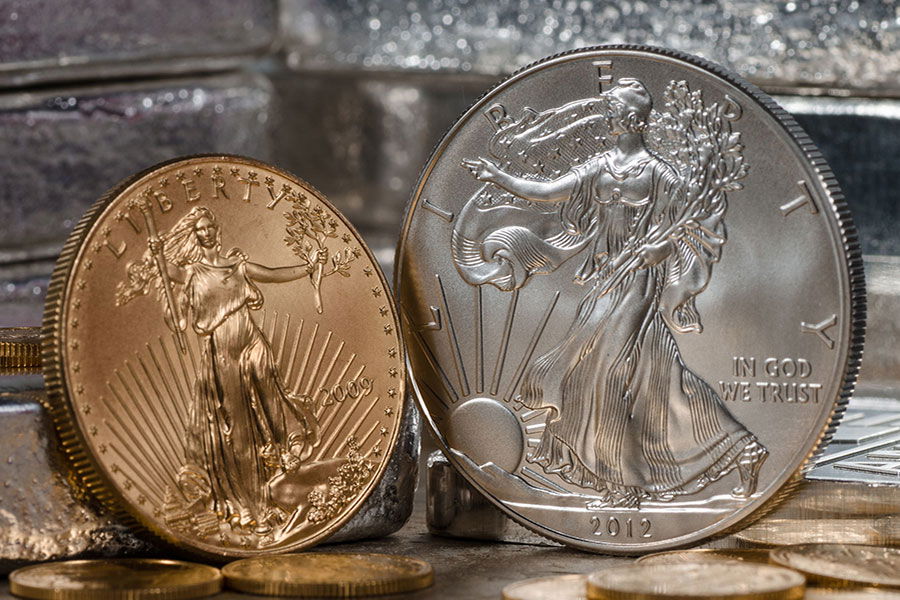Investing in gold is an investment strategy that dates back centuries, yet it still holds relevance in today’s financial landscape. The price of gold also tends to move in the opposite direction of the stock market, making it a useful asset during times of market turbulence.

For those seeking to diversify their investment portfolios and protect their wealth from the effects of inflation, investing in gold is a smart choice. However, it can be difficult for beginners to understand gold investing, with terms such as “bullion,” “ETFs,” and “mining stocks” causing confusion.
In this article, we’ll give you a comprehensive understanding of the key concepts of investing in gold, equipping you with the knowledge and resources to make informed investment decisions.
What is gold, and why do people invest in it?
Gold is a precious metal with a rich history as currency. It’s prized for its scarcity, allure, and endurance. Beyond its ornamental value, it is also widely acknowledged as a secure investment, offering a shield against economic instability and inflation.
Investors often invest in gold to diversify their portfolios and mitigate market fluctuations as a means of securing their assets and potentially weathering storms.
Why invest in gold?
Before we get into how to invest in gold, it can help to understand why gold is still a sound investment in 2024. The biggest reason is that gold is considered to be an inflation hedge, according to the World Gold Council.
An inflation hedge is an investment that protects the purchasing power of currency from rising costs due to inflation. An inflation hedge either maintains or increases its value over a long period of time.
For instance, the dollar bill is not an inflation hedge because its value decreases over time. In comparison, an ounce of gold can still purchase roughly the same amount of goods as it could 200 years ago.
You don’t want to have all of your assets tied up in gold. But for investors looking for ways to protect themselves from inflation, buying gold isn’t a bad choice. And gold can help you diversify your portfolio outside the stock market.
Pros and Cons of Investing in Gold
There are many advantages to gold investments, but there are also some downsides. If you’re on the fence about whether buying gold is the right strategy for you, here are a few pros and cons to think about first.
Pros
- Gold has intrinsic value
- It can serve as a hedge against inflation
- It’s a good way to diversify your portfolio
- Gold can provide a feeling of security
- It’s fairly easy to buy and sell gold coins
- There are multiple ways to get started investing
Cons
- It can be difficult to know if you’re getting a good deal
- Storing gold can be expensive
- Dealers can charge several hidden fees
- Gold doesn’t pay interest or dividends
5 Ways to Invest in Gold
Now that you understand why gold is a good investment, you may be asking yourself how to take the first step. Fortunately, there are numerous ways to invest in gold nowadays.
However, the multitude of options available may prove confusing for inexperienced gold investors. To alleviate this challenge, we’ve compiled a list of five reliable strategies for beginning investors seeking to construct a solid portfolio in gold.
1. Physical Gold
You can purchase physical gold in person or online in the form of gold bars or coins. Gold jewelry, which makes up almost 50% of global gold production, is another option. However, it’s typically not sold by gold dealers who offer gold bars, coins, or other bullion.
Owning physical gold has its advantages, the foremost being its tangible nature, providing investors with a greater sense of security and control.
However, caution must be exercised when selecting a dealer to purchase pure gold coins or bars from, as some may inflate prices.
It’s important to note that physical gold requires proper storage and can incur additional storage costs. Furthermore, gold is not a highly liquid asset, making its resale in the future potentially challenging.
Physical gold is also a popular choice for a gold IRA. By holding physical gold in an IRA, you can potentially protect your retirement savings from inflation and currency devaluation. Here are the best gold IRA companies of 2024.
2. Gold Stocks
One of the biggest issues many people have with gold investments is that there’s not much growth potential. Sure, gold retains its value, but it’s not going to earn you any money, which is the entire point of investing.
If this issue has been holding you back from buying gold, then you might consider gold mining stocks. Instead of purchasing physical gold, you’ll be investing in a gold mining company that engages in mining precious metals.
Many gold mining companies consistently outperformed the market during the fallout of COVID-19. For instance, Goldcorp, Franco Nevada Corp., and Kirkland Lake Gold Ltd. are all gold mining companies to consider.
However, when you buy gold stocks, you’re not technically investing in gold; you’re investing in a company. And that always comes with inherent risks. So if you choose to go this route, you’ll need to pay close attention to what’s going on with that company.
3. Gold Exchange-Traded Funds (ETFs)
To purchase gold without the hassle of storage costs, consider gold exchange-traded funds (ETFs). A gold ETF holds gold bullion at a storage facility and allows investors to buy shares of the fund.
Gold ETFs are a suitable investment option for beginners. You can easily purchase them through a brokerage account with reputable firms like Charles Schwab or Fidelity.
4. Gold Mutual Funds
If you are intrigued by the prospect of owning stock in gold mining companies, a gold mutual fund may pique your interest. This type of investment affords you a diverse collection of gold mining companies, rather than limiting you to a solitary entity.
While diversifying your portfolio is a wise move, it’s worth bearing in mind that fees associated with a gold mutual fund may be more substantial compared to alternative options. To invest in gold funds, it’s essential to find a broker you can trust for expert advice.
5. Gold Futures
Gold futures contracts are agreements to buy and sell gold at a later time; in the future. They are probably the riskiest way to invest in gold. The contracts represent a certain amount of gold, and they can pay out in either a dollar amount or the physical gold, depending on the specifications.
With gold futures options contracts, investors have the option to purchase a futures contract for a preset price at a certain point in time. This investment strategy is probably not best for beginners, but we wanted to include it just in case you have experience with futures and options.
See also: Precious Metals Investing: A Beginner’s Guide
What are the best gold investments for beginners?
If you’re venturing into the world of gold investments for the first time, you might be unsure about what path to take. There’s no one-size-fits-all solution. Each investment strategy has its own set of risks and benefits.
Think about what you hope to achieve and why investing in gold appeals to you. If you’re mainly seeking protection against inflation, you may want to buy physical gold. However, if generating income is your priority, gold stocks or a gold mutual fund could be a more suitable option.
It’s worth remembering that gold should only occupy a small portion of your overall investment portfolio. Ideally, it should make up no more than 10%. This way, you can diversify your investments while avoiding excessive risk.
Bottom Line
As you are now aware of the advantages and drawbacks of gold investments, along with the various ways to get started, it’s time to make a move. To ensure a successful gold investment journey, it’s recommended to start with a small investment and gradually increase it over time.
Doing thorough research on the company you plan to invest with is critical. Take the time to gauge their level of transparency and fee structure when talking to them. Additionally, reading ratings and reviews from previous customers can give you an idea of the kind of experience you can expect.
However, by taking a measured approach and making informed investment decisions, you can secure your finances against potential market fluctuations in the future.
Frequently Asked Questions
Is gold a good investment for beginners?
For those new to investing, gold is seen as a stable and relatively safe option to consider. However, it’s important to weigh your financial goals, risk tolerance, and investment timeline before making a decision.
What are the risks of investing in gold?
Like any other asset, gold can be volatile, and its value can be impacted by various factors, such as market demand, economic factors, and political events. Additionally, physical gold requires storage and insurance, which can be an added expense.
How much gold should I include in my investment portfolio?
The ideal amount of gold in your portfolio can vary, but some financial experts recommend allocating 5-10% as a way to diversify and potentially protect against market swings. It ultimately depends on your financial goals.
What is the best way to buy gold?
The most suitable method for purchasing gold depends on your individual needs and investment goals. For those looking to own physical gold, coins or bars from a reputable dealer might be the way to go.
If you prefer to invest in financial instruments, like gold ETFs and mutual funds, working with a financial advisor or opening a brokerage account could be a better choice.
How is the price of gold determined?
The price of gold is influenced by numerous elements. Jewelry and technology industries’ demand for the metal and investment purposes are some contributing factors.
Additionally, the quantity of gold held in central bank reserves, fluctuations in the value of the U.S. dollar, and investors seeking to protect themselves against inflation or currency depreciation, all play a role in determining the value of gold.
How do I store gold safely?
When it comes to safely storing physical gold, options include a bank safe deposit box, a home safe, or a professional storage facility. Additionally, insurance can protect against loss or damage. Ensure you take the necessary measures to protect your investment.
Is gold a good investment during a recession?
Investing in gold can be a smart way to diversify and buffer your portfolio against economic downturns. Historically, gold has demonstrated a low correlation with other types of investment assets, making it a useful tool in protecting against market volatility.
During times of economic stress, such as a recession, gold prices tend to rise as bond yields fall. However, keep in mind that the effectiveness of gold as an investment during any stage of the economic cycle will depend on how it fits into your personal investment plan.




